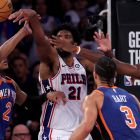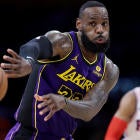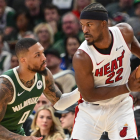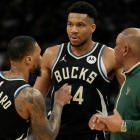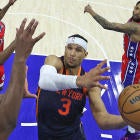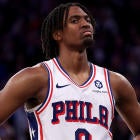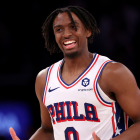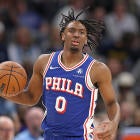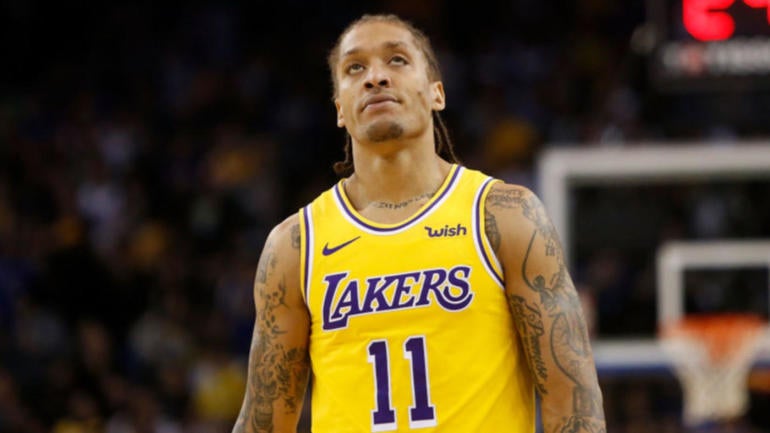
Last year, tears formed in Michael Beasley's eyes as he said he would rather die with some kind of dignity than to keep reaching out and feel unheard. Now, the former NBA player is using his voice to help those who find themselves in the same position.
"My message right now is if you are feeling something, not feeling OK, it's OK to ask questions. It's OK to be curious. It's OK to want to figure out your own mind," Beasley told CBS Sports. "Sometimes you're frustrated and not mad. Sometimes you're sad and not mad."
In March 2022, Beasley did an interview with The Pivot, a podcast hosted by former NFL players Channing Crowder, Fred Taylor and Ryan Clark. The conversation was originally going to be about basketball, but it soon became a discussion of Beasley's struggles.
"I think that interview just struck a nerve and you got what you got," Beasley said. " ... That is a part of the journey, trying to detach yourself from the character, the star, the basketball player, what people know, because that is what people know you as. Sometimes it gets overbearing, but it comes with the territory."
Beasley was selected by the Miami Heat with the No. 2 pick of the 2008 NBA Draft, and his basketball skills have never been in question. However, his off-court reputation hasn't been the best, and Beasley would be the first to admit he hasn't always made the right choices. Beasley became known as a rule breaker as soon as he got in trouble in the Rookie Transition Program, and his NBA career included headlines of marijuana use, traffic stops, attitude problems and legal drama with his former agent.
It's been four years since Beasley was on an NBA roster, as he last played for the Los Angeles Lakers in 2019. Beasley's time in L.A. was not easy, as he missed a lot of time while tending to his family. His mother was fighting cancer and died in December 2018.
Life has thrown Beasley some curveballs, and sometimes acting up is really just a call for help. Beasley's first step to feeling better, then, was simple in theory but difficult in practice: getting to know himself.
Beasley said he had to really put in the work to feel more comfortable in getting to know people and for people to get to know him. The main message he had to keep repeating to himself was, "You're worth it."
"Don't feel like you are the only one going through it," Beasley affirmed. "We all go through things differently, but feel open to talk about it. There is somebody there to help you."
Beasley has been using a wellness app called Aura that has features such as coaching, meditation and relaxing sounds. But he is not just consuming the content; he is creating it too. While there have been times during his life when he didn't know how to put his feelings into words, Beasley shared his story on Aura.
He explained that he felt he could conquer the world with a basketball in his hand, but off the court he struggled sorting out his feelings, which were reflected in his attitude. There were times when his social media posts even made people think he was suicidal.
"Y do I feel like the whole world is against me!!!!!!! Back on my FTW!!!!! I Can't win for losin!!!!!!!!!" Beasley tweeted on Aug. 21, 2009.
A few hours later, he added, "Feelin like it's not worth livin!!!!!!! I'm done"
He took down his account shortly after those posts.
"At the time I didn't know I was sad, I was depressed, I was anxious, stressed out. I was confused," Beasley said on Aura. "I couldn't decipher any of those feelings, I was just angry all the time. Yelling, lashing out. It was just something I had to figure out."
Beasley went to a rehabilitation center in Houston in 2009, which he said is when he started developing a routine and reaching out more. He is now trying to use his story to help break the mental health stigma.
"Honestly, if one person hears it that's enough for me," Beasley said. "That's kind of my mindset, but I want as many people as I can. Get it across that you're not alone and that you do have help. I urge people to be vulnerable, speak up, love each other, be accepting, be understanding."
He said if he could give advice to his younger self it would be a simple reminder that nobody has it all figured out and to just be confident, speak up and keep going.
But changing the way mental health is perceived is not just about sharing experiences. It's also about stepping up and helping others.
Beasley has pointed out situations such as the one former NBA player Delonte West found himself in a few years ago. West was struggling with mental health and substance abuse issues and was photographed by strangers while on the street. Dallas Mavericks owner Mark Cuban offered to help, but West's lowest point was shared all over social media.
"We see too many people go through things and we just laugh, we just make jokes, make memes. They are going through real things… Guys like Delonte West, there are going to be many more behind him," Beasley said. "There are many more out there, just may not be as famous as he is. My heart goes out to all those guys and I just wish instead of pulling our phones out we lend a helping hand."
I talked to NBA/CBA player Michael Beasley today and we had a great conversation about mental health.
— Isabel Gonzalez (@cisabelg) August 18, 2023
“We see too many people go through things. We just laugh, make jokes, make memes… I just wish instead of pulling our phones out, we just lend a helping hand.” pic.twitter.com/aKiCdoMpps
Beasley said he hopes mental health conversations continue getting easier for the next generation. He said he wears his emotions on his sleeve and has learned that ignoring the outside noise is important.
"People are going to laugh, people are going to say what they want to say," Beasley said. "I just say that's the immaturity in them, the insecurities in them. Live in your truth, and as long as you're honest, there is nothing to be embarrassed about."
Beasley said that although there is still a mental health stigma, he is glad to see other athletes like DeMar DeRozan and Kevin Love be open about it. In 2018, Love wrote about his struggles with depression and has been commended on multiple occasions for his mental health advocacy efforts.
"One of the things that made it easier for me was when Kevin Love spoke on it. DeMar DeRozan also," Beasley added. "Those are two guys I grew up with and Kevin is just a guy I admire. When you are able to see your heroes, people who in your mind are some of the strongest people in the world be vulnerable, it becomes a little easier. Still, the first hurdle is getting over yourself."
Beasley has been living a life mostly out of the spotlight in recent years. He has been playing basketball overseas and participated in the 2023 BIG 3 season, which showcased his skills and earned him the Too Hard to Guard award after he averaged 21.6 points per game.
He said he is playing basketball everyday and is looking for an NBA contract, but plans to return to the Chinese Basketball Association if that doesn't happen. Right now he is just focusing on his family, his wellbeing and the sport he loves.
"I'm having fun, that's it," Beasley said. "I'm having fun."














